Thomas E. Ricks's Blog, page 116
April 8, 2013
Emile Simpson's 'War From the Ground Up': Not just for Best Defense anymore
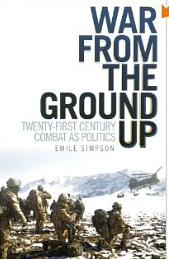
Michael Howard, one
of the great military historians, gives Emile
Simpson's War From the Ground Up
about 10 thumbs up in a
new review, calling it "a work of such importance that it should be compulsory
reading at every level in the military; from the most recently enlisted cadet
to the Chief of the Defence Staff and, even more important, the members of the
National Security Council who guide him."
The trial of the Lincoln conspirators
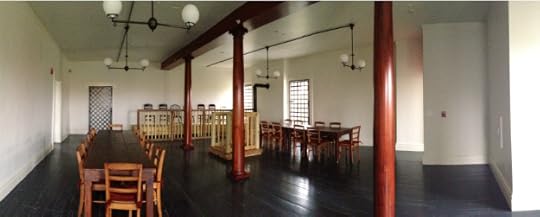
The National Defense University and Fort McNair
last week dedicated Grant Hall, which contains a re-creation of the 1865 court
room where the Lincoln conspirators were tried. Below are comments made at the
dedication by Hans Binnendijk, former vice president of NDU, who led the team
that remodeled Grant Hall and recreated the trial scene:
This
evening we are gathered to dedicate Grant Hall and to witness the recreation of
the 1865 court room where justice was dispensed to those conspiring to
assassinate Abraham Lincoln and to decapitate the United States government. It
is here that the last chapter of our calamitous Civil War ended.
It
is fitting that this historic building be named in honor of Ulysses S. Grant,
the General-in-Chief of the Union Army during our Civil War and subsequently
our 18th President. He was in command while the trial of the Lincoln conspirators
took place and this part of the original penitentiary was preserved during his
presidential administration. Grant Hall's proximity to Lincoln Hall reminds us
of the friendship and trust these two men shared.
The
trial began on May 9, 1865, less than a month after Lincoln's assassination. A
laundry room above the Deputy Warden's quarters was converted to a court
room. That court room now looks much as
it did in 1865. The eight defendants were held in the cells isolated,
handcuffed and chained. The men were forced to wear cloth hoods over their
heads. The nine person jury or commission was made up predominantly of Army
officers. The use of a military court to
try civilians was controversial at that time, as it is now. A simple majority
was needed to find guilt and a 2/3rds majority was required for the death
penalty. Defense attorneys were given very little time to prepare. There was no
appeal except to President Andrew Johnson.
And he was in no mood to grant appeals.
The
trial lasted longer than Secretary of War Edwin Stanton would have liked. He
wanted a very speedy trial to avoid any chance of rekindling the Confederacy. A
total of 351 witnesses were called. On July 5 the commission sent its verdict
to President Johnson who concurred with all of their findings except for
clemency for Mary Surratt.
On
July 6 the defendants were told about their fate and on July 7, 1865, four were
hanged. Alexander Gardner captured their
execution in a series of photos that set a new standard at the time for
photojournalism. The other four defendants were sent to prison in the Dry
Tortugas - three returned alive. Three of the four who were hanged (Lewis
Powell, George Atzerodt, and David Herold) were in my view clearly guilty of a
capital offense. Powell assailed and
nearly killed Secretary of State Seward. Atzerodt got drunk and decided not to
assassinate Andrew Johnson, but he had advance knowledge of the plot. Herold
joined Booth in his escape.
The
fate of Mary Surratt has led to continued controversy. Many books and now the
movie The Conspirator argue her case. She was certainly a Confederate
sympathizer and her son John Surratt was among the earliest of Booth's
conspirators. Her boarding house on H Street was considered to be "the nest in
which the plot was hatched." She visited
her home in what is now Clinton, Maryland, on the day of the assassination to
deliver a package for John Wilkes Booth; that was Booth's first stop after
assassinating Lincoln. The issue became "what did she know and when did she
know it." There was clearly some witness-tampering and she was convicted based
on circumstantial evidence.
With
this ceremony, Grant Hall joins several other buildings that played a crucial
role in the events surrounding Lincoln's assassination and that have been renovated.
There is Ford's Theater with its wonderful museum in the basement, the Peterson
House where Lincoln died; the Surratt House Museum in Clinton, Maryland; and
now Grant Hall. Mary Surratt's boarding house on H Street has a historic plaque
on it but remains a Chinese restaurant. That should be the renovators' next target.
April 5, 2013
Here's the most controversial military document that Best Defense has ever run

It was put together by "A Smart
Army Major" who clearly is enjoying the sequester.
The book so nice JFQ reviewed it twice!
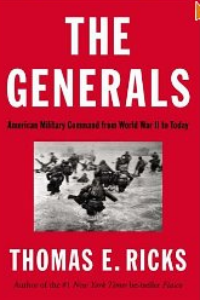
I
only recently saw that the new issue of Joint
Forces Quarterly contains two thoughtful reviews of The Generals.
The
first is by Marine Lt. Col. Robert Bracknell. "Specifically
identifying the Army's modern-era reluctance to effect senior leader reliefs as
a departure from the pattern of history, Ricks paints an image of the ultimate
country club, self-righteously convinced of its own infallibility -- an Army
for the sake of The Army, rather than for the sake of the Nation," he writes. He faults the book, though, for
underestimating "the moral component necessary to
maintain the respect of privates, sergeants, captains, and colonels." His
bottom line is that, "If the military truly is as
reflective and self-critical as it likes to advertise, The Generals should land on the Chairman's and
Service chiefs' reading lists soon." (Tom: Not holding breath.)
The
second review is by grand old strategist Alan Gropman, who
singles out the Vietnam section of the book: "The
strategic debacle in Vietnam is exceptionally well treated." I appreciated that because I
thought the Vietnam discussion was one of the most interesting parts of the
book and so I have been surprised that so few reviewers commented on it.
Gropman
disagrees with my sections on counterinsurgency, because he has concluded that
we simply can't do it:
Ricks appears to believe
counterinsurgency combat is a valid combat mission for the U.S. military. It is not.
I do not understand why any political decisionmaker, after costly failures in
Vietnam, Iraq, and Afghanistan, would advocate counterinsurgency. We go to war
in places we do not understand -- in order to save nondemocratic and often
corrupt states that are open to attacks by insurgents -- against adversaries
who have greater knowledge than we do of the countries we fight.
Tom again: I would say that the war you can't fight is the
war the enemy is most likely to seek.
Gropman's bottom
line: "read Tom Ricks' The Generals to
appreciate better the awful costs to the United States of failures in strategic
thinking."
Rebecca's War Dog of the Week: British Forces send more dogs to Afghanistan

By Rebecca Frankel
Best Defense Chief Canine Correspondent
Earlier this week, ISAF Deputy Chief Lt. Gen. Nick Carter warned
against a hasty withdrawal from Afghanistan, saying:
It would be
unforgivable if we allowed the gains of the last three years to be lost because
we were not able to provide the Afghans with the support to take this through
into 2014."
In the wake of Carter's comments the news that British
Forces are not pulling back their canine forces but fortifying them is of
particular interest. As part of the overall NATO drawdown, British troops are
set to pull back nearly half their forces by the end of 2013. But last month, the
remaining combat-ready dog teams of the 104 Military Working
Dog Unit deployed to Afghanistan as part of Operation
Herrick, bringing their number to 90 teams in all. Perhaps more noteworthy
still is that this number is relatively higher than that of dogs on the ground two
years ago, when British Forces had approximately
70 dog teams in Afghanistan in 2011.
The newest British dog teams in Afghanistan will be part of
the Explosive Ordnance Disposal and Search Task Force, which pulls
its canine teams from a total of "15 units from all three services." The job of
these dogs is really no more special or any different than it's been throughout
the war -- they will be "patrolling the bases where fellow British soldiers are
based, searching vehicles at checkpoints and going out on patrols on the front
line." But now that NATO forces are preparing to disengage, these dog teams
will also play a role in "mentoring the Afghan National Security Forces" and
helping to facilitate the coming transition.
Many of these British handlers who
deployed in March are going into combat with their dogs for the first time. They've
had one full year of training and their commander Major Ian Razzell has full
confidence in their abilities as well as their certain success. "I am proud of
every single soldier," he said.
"They will do a
good job, there is no doubt about it, they are first rate professional soldiers
as well as dedicated handlers.
Bonus Note: The 1st Military
Dog Regiment's motto is Vires in
Varietate: Strength in Diversity.
Rebecca Frankel is away from her FP desk, working on a book about
dogs and war.
April 4, 2013
'The Darker Side of Cohesion': A military problem I'd like to read more about

You don't see much
discussion of the downside of cohesion, so I was interested to see this
comment by Pete Kilner on page 70 of the April issue
of ARMY:
A team is too
cohesive if its Soldiers prioritize their loyalty to each other above their
loyalty to Army values. Such a team risks covering up unethical behavior and
dealing with it solely ‘in house.' Leaders must ensure that cohesive teams are
as loyal to our professional values as they are to each other.
Tom again: This made
me wonder. We had very cohesive small units in Iraq and Afghanistan. How did
this change the conduct of the war? Has anyone examined abuses in the context
of high- and low-cohesion units? I know, it might be impossible, because if
Kilner is correct, then abuse by high-cohesion units disproportionately won't
be reported.
My bet is that one of
the signs of real trouble is when the cohesion is at odds with the chain of
command. I remember seeing a Marine platoon in Somalia where the platoon leader
was out of it, almost shoved aside by a charismatic NCO -- who turned out to be
a natural-born criminal.
Hagel's speech at NDU Wednesday

It was underwhelming. Got it, he admires Ike. So do I. As a
friend of mine said, "This was a terrible
speech. Said nothing and awful delivery."
Not a good sign for a SecDef leading a Pentagon on the budget
roller coaster.
To fix PME, first we need to fix a national culture that doesn't value critical thinking
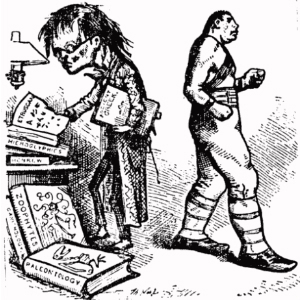
By Victor Glover
Best Defense guest columnist
The professional military education
(PME) system may need fixing, but in the service we don't value graduate
education and that needs to be fixed first.
The military is a microcosm of
society and we suffer from the same anti-intellectualism (to borrow from Richard Hofstadter) that plagues
modern society. The military does not
have a critical thinking problem -- the whole country does. While I agree that we need to address the
range of problems with critical thinking (specifically analysis and
communication) I do not agree that the problem is undergraduate education and I take even
greater exception to the notion that technical education is a part of the
problem.
This problem does not begin in the
field-grade military, college, or even high school. We've had a critical down-turn in
junior-high/middle school compared to other developed
nations.
I specifically follow mathematics and science trends, however U.S.
education generally trends the same. If
you want to attack the worthwhile issue of accession quality, you are biting
off the mother lode. The data suggest
that we have to go back to around grade 5 to reach a steady-state
solution. I do work at this task, not
for the military's sake, but for the country's.
However, this is not something we can directly address from inside the
leaning military machine. So what then,
are we studying the wrong things?
History, politics, anthropology,
geography, and diplomacy are indeed pertinent disciplines for the officer of
today. Breadth of education, to include
scientific and technical education, is important for the officer of the
future. The real problems in life don't
come in boxes labeled "physics" or "sociology;" they demand the efforts of the
broadly and deeply educated and trained.
I will borrow from Consilience: the Unity of
Knowledge by the polymathic Edward O. Wilson. I will not try and summarize the wonderfully
complex tome, but please allow a long quotation:
Every
college student should be able to answer the following question: What is the
relation between science and the humanities, and how is it important for human
welfare? Every public intellectual and political leader should be able to
answer that question as well. Already half the legislation coming before the
United States Congress contains important scientific and technological
components. Most of the issues that vex humanity daily -- ethnic conflict, arms
escalation, overpopulation, abortion, environment, endemic poverty, to cite
several most persistently before us -- cannot be solved without integrating
knowledge from the natural sciences with that of the social sciences and
humanities. Only fluency across the boundaries will provide a clear view of the
world as it really is, not as seen through the lens of ideologies and religious
dogmas or commanded by myopic response to immediate need.
Specifically relating to the Treaty
(or Peace) of Westphalia, the impact of this series of treaties on the
relations of sovereign nations is indelible and important for the public
servant. Likewise are the technical and
contractual details of the multibillion (tax-payer) dollar F-35 Lighting II
aircraft program, their impact on the perceived success of the effort, and the
larger logistical and tactical impact of a single-point strike-fighter solution
on our common defense. PME is not just
about history. It is all things
operational and strategic to equip the field grade and above.
We in the military can address and
affect this strategic and operational deficit and the larger PME system. First, we have to understand the problem by
discussing the nature of the issue (as we are).
Then we can manipulate our recruitment, retention, and advancement
systems more effectively.
One of the reasons we do not have the
critical or strategic thinking en masse is that it is not always required. When it is required, we are trying to hone it
from professionals grown in an active warfighting organization, not always
conducive to critical and strategic development. We also live in a "do" oriented country and
are therefore in a "do" oriented military.
What we have to figure out is how to do while finding time to dialogue,
debate, philosophize, analyze, study, think, and sit still. Hopefully the end of this era of war will
encourage us to consider this.
The core of this issue however, is
not education or the availability thereof.
The large animals in the room are personnel management and
advancement. To inculcate critical thinking
across the department will require adjustments to our evaluation and promotion
systems. We in the warfighting
profession do not make up a monolithic bureaucracy. There are many facets to military service,
but we promote as if everyone is striving for the same goal.
We do not highlight the junior
personnel content with middle management as their highest aspiration while
mastering that realm. We also do not
reward the disciplined specialist in the operational force as we all have to be
generalists. In contrast to my earlier
statement about the broadly educated and trained, we focus too much on the
broadly trained and experienced and not enough on the broadly and deeply
educated. Somewhere there is balance we
are failing to strike.
In the Navy F/A-18 community we refer
to our training as being a jack-of-all-trades and master of none. I do not believe the promotion system is
wrong or improper for our mission, just that it is too rigid. Yes we have to cull the field, yet all
enlisted personnel do not want to be the senior enlisted advisor to the chief,
nor all officers the chief. Integrating
career flexibility and educational priority into our personnel system would
have a profound impact and I believe we are trying. If we change the system to value critical
analysis and communication abilities, where then do we attain these?
We are fed from and posses
institutions that can educate broadly and deeply, cultivating critical
thinkers. In my experience, Cal Poly,
the Naval Postgraduate School, and the Air Command and Staff College are among
these institutions possessing great educators.
Professors like Dan Walsh, Jim LoCascio, Gary Langford, Mark Rhoades,
and Jonathan Zartman understand the mission, the pupil, and the material, and
mush them together until they get the learning outcome they want. Put the Peace of Westphalia where it is not,
in the context of the learner, and you will undoubtedly root it in the minds of
your students. A facet of the solution
lies in the hands, heads, and hearts of the academe. Once the services reward rigorous graduate
education, we will also see the professorship, military and civilian, evolve
for the better. We will also see the
opportunities to attend the nations elite institutions grow and expand, also
for the better. In today's fiscally
constraining environment, civilian graduate institutions may serve as a bulwark
in maintaining a professional and educated officer corps.
Another facet of the solution lies
with the individual service member. I am
a carrier-based aviator and test pilot serving as a fellow in the legislative
branch of government. After this stint
in the staff world I hope to return to the operational flying world. I cannot rightly blame the Navy for the
difficulty in training and educating me to think and communicate effectively. What are they to train me for next? At each juncture in my career I didn't know where
I would be next until I got the call to pick up and leave. However, I have always been given what was
required to do my job whether landing on a carrier, evaluating weapon systems,
or supporting the legislative process.
An important part of a servicemember's
critical development is his or her personal and professional duty. We are most useful when equipped to deal with
a range of problems even before we are required to. I want to give my best in service, so I ought
to grasp the opportunities to get better with both hands. My career has given me a context to
appreciate subjects that I did not appreciate when I was a full-time student.
Context has helped me grow concern for the way these subjects affect my life
and service. I would love to go back and
be an undergraduate again but I cannot, so I take every opportunity to learn
while I can. Does our professional
military education system need righting?
Not as much as our understanding of the importance of education within
the military.
Lieutenant Commander Victor Glover (@VicGlover ) is
a graduate of Cal Poly, Officer Candidate School (with distinction), Air
Command and Staff College (with distinction), Air Force Test Pilot School, and
the Naval Postgraduate School. He recently completed a tour as a department
head in a strike-fighter squadron and is currently a legislative fellow in the
United States Senate. The views expressed are his own.
April 3, 2013
Mission command, circa 1805
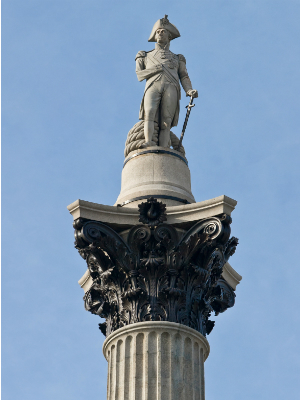
I see the Spanish
seem to be contemplating a replay of the battle of Trafalgar.
That reminds me of
something I read the other day, that Lord Nelson's form of mission command was very intensive conversation
before the fight, very hands off once it began, observed A.B.C. Whipple:
Nelson believed in
sharing tactical options with his captains, discussing every possible situation
and emphasizing that when battle was in progress, every captain would be on his
own. If a captain saw an opportunity to do damage to the enemy, he was free to
attack without awaiting signals from the flagship's masthead. The old
line-ahead dogmas of each ship's blindly following the leader was not only
dead, it was replaced by something previously unheard-of
in the Royal Navy: delegation of authority.
When the U.S. military makes up its mind to really change, it is very good at doing it
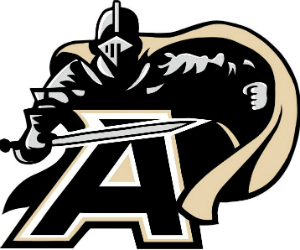
Here is Andrew Sullivan's
report from
his visit to West Point for the annual "Knights Out" dinner of gay cadets.
Thomas E. Ricks's Blog
- Thomas E. Ricks's profile
- 436 followers



